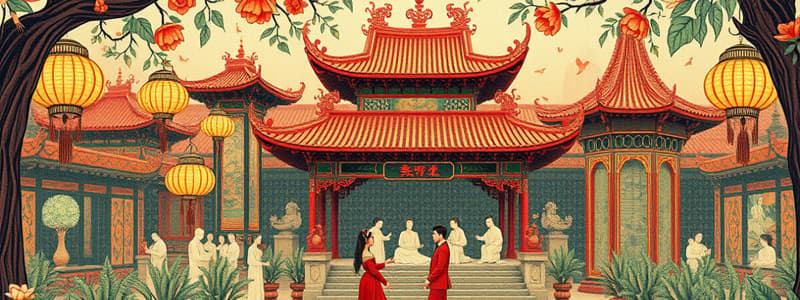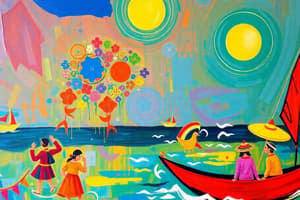Podcast
Questions and Answers
What does Tet Nguyen Dan celebrate?
What does Tet Nguyen Dan celebrate?
- The founding of the nation
- The beginning of the lunar new year (correct)
- The harvest season
- The birth of Buddha
Which festival is known for lantern processions and mooncakes?
Which festival is known for lantern processions and mooncakes?
- Da Lat Flower Festival
- Tet Trung Thu (Mid-Autumn Festival) (correct)
- Perfume Pagoda Festival
- Hung Kings' Temple Festival
What is a key custom of the Hung Kings' Temple Festival?
What is a key custom of the Hung Kings' Temple Festival?
- Offering food and cultural performances (correct)
- Spring cleaning of homes
- Planting rice paddies
- Wearing traditional clothing only
When is the Da Lat Flower Festival typically held?
When is the Da Lat Flower Festival typically held?
Which festival features a pilgrimage to a major Buddhist site?
Which festival features a pilgrimage to a major Buddhist site?
Flashcards are hidden until you start studying
Study Notes
Overview of Festivals in Vietnam
- Vietnam has a rich tradition of festivals, reflecting its diverse culture and history.
- Festivals often celebrate agricultural cycles, historical events, and religious beliefs.
Major Festivals
-
Tet Nguyen Dan (Lunar New Year)
- Date: Late January to mid-February (based on lunar calendar).
- Significance: Marks the beginning of the lunar new year.
- Customs: Family reunions, ancestral worship, special foods (e.g., Banh Chung), and fireworks.
-
Mid-Autumn Festival (Tet Trung Thu)
- Date: 15th day of the 8th lunar month (September or October).
- Significance: Celebrates the harvest and children's joy.
- Customs: Lantern processions, mooncakes, and children performing traditional dances.
-
Hung Kings' Temple Festival (Gio To Hung Vuong)
- Date: 10th day of the 3rd lunar month (April).
- Significance: Honors the legendary Hung Kings, founders of the nation.
- Customs: Pilgrimage to the Hung Kings’ Temple, offering food, and cultural performances.
-
Da Lat Flower Festival
- Date: Annually in December.
- Significance: Celebrates the flower-growing industry in Da Lat.
- Customs: Flower exhibitions, parades, and art performances.
-
Perfume Pagoda Festival (Le Hanh Huong)
- Date: From the 6th lunar month until the end of the 3rd lunar month.
- Significance: Pilgrimage to the Perfume Pagoda, a major Buddhist site.
- Customs: Boat trips, hiking, and offering prayers.
Regional Festivals
-
Buddha’s Birthday (Phat Dan)
- Celebrated nationwide, featuring ceremonies at temples.
-
Nghinh Ong Festival
- Celebrated in coastal areas to honor the whale, considered a guardian of fishermen.
-
Kate Festival
- Celebrated by the Cham people in central Vietnam, focusing on their cultural heritage.
Common Features of Festivals
- Cultural Performances: Traditional music, dance, and theatrical performances are integral.
- Food: Local delicacies are prepared and shared among participants.
- Community Involvement: Festivals often involve communal activities, fostering a sense of unity.
- Religious Elements: Many festivals include rituals and offerings to ancestors or deities.
Conclusion
- Festivals in Vietnam are vital to preserving cultural identity and heritage.
- They provide opportunities for social gatherings, reflection, and celebration of both historical and agricultural significance.
Overview of Festivals in Vietnam
- Vietnam's festivals showcase a blend of diverse cultural heritage and historical significance.
- Celebration themes often center around agriculture, history, and religious traditions.
Major Festivals
-
Tet Nguyen Dan (Lunar New Year)
- Takes place between late January and mid-February, aligned with the lunar calendar.
- Symbolizes the new lunar year, emphasizing family ties, ancestral veneration, and seasonal renewal.
- Traditional practices include family gatherings, preparing Banh Chung (sticky rice cake), and community fireworks.
-
Mid-Autumn Festival (Tet Trung Thu)
- Celebrated on the 15th day of the 8th lunar month, typically occurring in September or October.
- Focuses on appreciating the harvest and invoking children's happiness.
- Features include lantern processions, sharing mooncakes, and traditional dance performances by children.
-
Hung Kings' Temple Festival (Gio To Hung Vuong)
- Occurs on the 10th day of the 3rd lunar month, usually in April.
- Commemorates the Hung Kings, regarded as the nation's founders.
- Activities involve pilgrimage to the Hung Kings' Temple, offering food, and engaging in cultural performances.
-
Da Lat Flower Festival
- An annual event held in December, celebrating Da Lat's renowned flower industry.
- Highlights include floral exhibitions, parades showcasing flower-sculpted floats, and artistic performances.
-
Perfume Pagoda Festival (Le Hanh Huong)
- Runs from the 6th lunar month to the end of the 3rd lunar month.
- Serves as a pilgrimage to the Perfume Pagoda, a prominent Buddhist site.
- Visitors partake in boat rides, hiking to the site, and making offerings and prayers.
Regional Festivals
-
Buddha’s Birthday (Phat Dan)
- Celebrated throughout the country, highlighted by special ceremonies at temples.
-
Nghinh Ong Festival
- Honors the whale, revered as a protector of fishermen, primarily in coastal regions.
-
Kate Festival
- Observed by the Cham community in central Vietnam, emphasizing their unique cultural heritage.
Common Features of Festivals
- Cultural Performances: Include traditional music, dance, and theatrical displays that enrich the festivities.
- Food: Regional specialties are prepared and shared, enhancing communal bonds during celebrations.
- Community Involvement: Festivals foster group participation and shared experiences among locals, promoting unity.
- Religious Elements: Many festivals incorporate rituals and offerings, showcasing spiritual beliefs and ancestral respect.
Conclusion
- Vietnamese festivals play a crucial role in maintaining cultural identity and heritage.
- They serve as platforms for social interaction, reflection, and celebrating both historical events and agricultural practices.
Studying That Suits You
Use AI to generate personalized quizzes and flashcards to suit your learning preferences.




